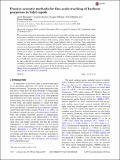Passive acoustic methods for fine-scale tracking of harbour porpoises in tidal rapids
Abstract
The growing interest in generating electrical power from tidal currents using tidal turbine generators raises a number of environmental concerns, including the risk that marine mammals might be injured or killed through collision with rotating turbine blades. To understand this risk, information on how marine mammals use tidal rapid habitats and in particular, their underwater movements and dive behaviour is required. Porpoises, which are the most abundant small cetacean at most European tidal sites, are difficult animals to tag, and the limited size of tidal habitats means that any telemetered animal would be likely to spend only a small proportion of time within them. Here, an alternative approach is explored, whereby passive acoustic monitoring (PAM) is used to obtain fine scale geo-referenced tracks of harbour porpoises in tidal rapid areas. Large aperture hydrophone arrays are required to obtain accurate locations of animals from PAM data and automated algorithms are necessary to process the large quantities of acoustic data collected on such systems during a typical survey. Methods to automate localisation, including a method to match porpoise detections on different hydrophones and separate different vocalising animals, and an assessment of the localisation accuracy of the large aperture hydrophone array are presented.
Citation
MacAulay , J D J , Gordon , J C D , Gillespie , D M , Malinka , C E & Northridge , S P 2017 , ' Passive acoustic methods for fine-scale tracking of harbour porpoises in tidal rapids ' , Journal of the Acoustical Society of America , vol. 141 , no. 2 , pp. 1120-1132 . https://doi.org/10.1121/1.4976077
Publication
Journal of the Acoustical Society of America
Status
Peer reviewed
ISSN
0001-4966Type
Journal article
Collections
Items in the St Andrews Research Repository are protected by copyright, with all rights reserved, unless otherwise indicated.

